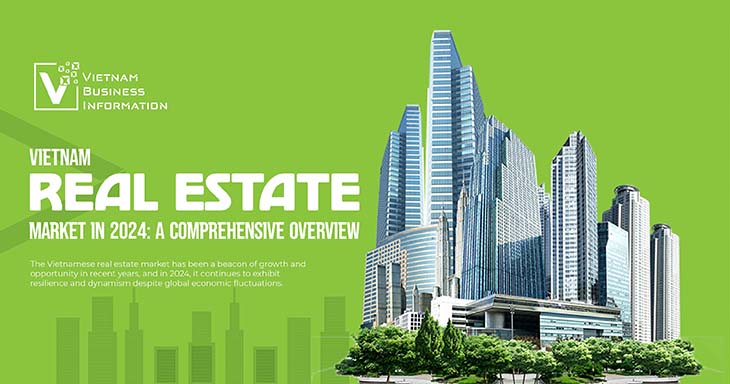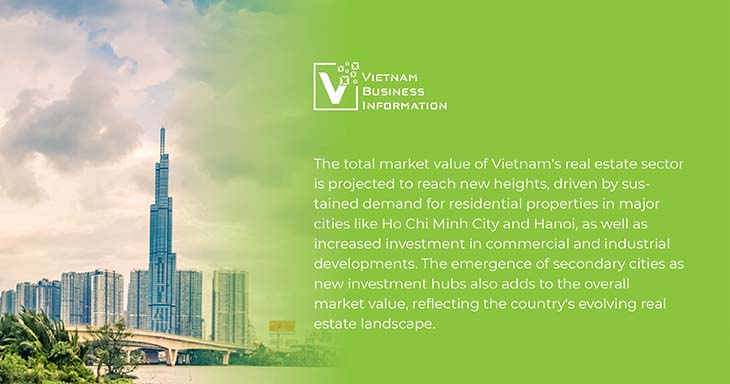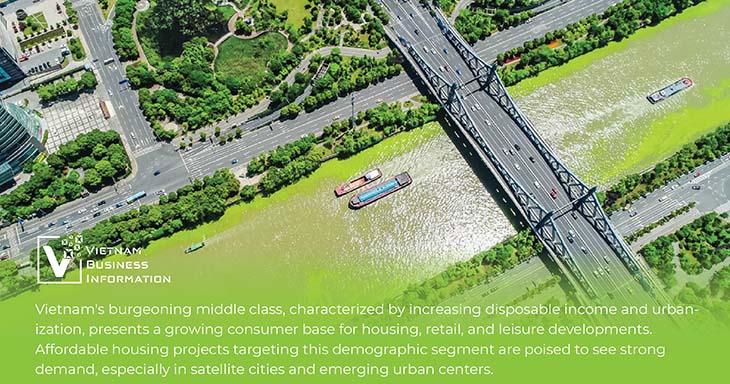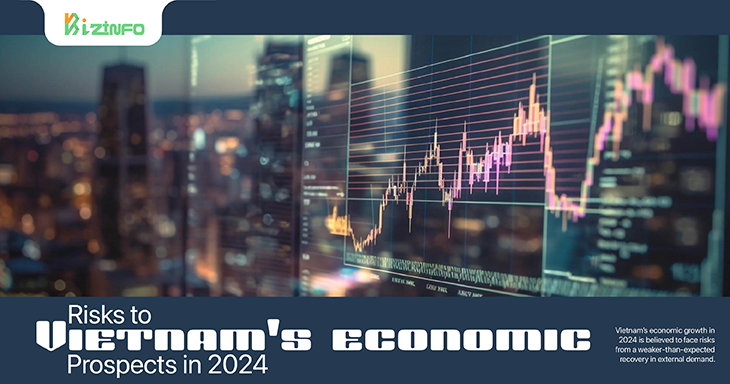Published Apr 2024
Vietnam real estate market in 2024: A comprehensive overview
The Vietnamese real estate market has been a beacon of growth and opportunity in recent years, and in 2024, it continues to exhibit resilience and dynamism despite global economic fluctuations.

With a combination of favorable demographic trends, robust urbanization, and government initiatives, the market has remained attractive to both domestic and international investors. Explore the market value, prevailing trends, opportunities, and challenges shaping the landscape of Vietnam's real estate sector in 2024 with VBI in this article.
Market value
The real estate market in Vietnam has experienced significant growth in recent years, with both residential and commercial segments contributing to its burgeoning market value. In 2023, the market witnessed a steady appreciation in property prices, fueled by strong demand and supportive government policies. In 2024, this upward trajectory is expected to continue, albeit with a more nuanced outlook.
The total market value of Vietnam's real estate sector is projected to reach new heights, driven by sustained demand for residential properties in major cities like Ho Chi Minh City and Hanoi, as well as increased investment in commercial and industrial developments. The emergence of secondary cities as new investment hubs also adds to the overall market value, reflecting the country's evolving real estate landscape.

Trends
Several key trends are shaping the Vietnamese real estate market in 2024:
- Sustainable development: With growing environmental consciousness and regulatory requirements, developers are increasingly incorporating sustainable practices into their projects. Green buildings, energy-efficient designs, and eco-friendly amenities are becoming standard features, reflecting a shift towards sustainable development.
- Digitalization: Technology is revolutionizing the real estate sector, with digital platforms and virtual tools enhancing property transactions, marketing, and management processes. Virtual reality tours, online property portals, and smart home solutions are gaining traction, catering to the evolving needs of tech-savvy consumers.
- Mixed-use developments: Integrated developments that combine residential, commercial, and recreational elements are gaining popularity, offering residents a holistic lifestyle experience. Mixed-use projects not only optimize land use but also create vibrant urban communities, driving demand from both investors and end-users.
- Co-living and co-working spaces: The rise of the sharing economy has spurred demand for co-living and co-working spaces, particularly among millennials and young professionals. Developers are tapping into this trend by offering flexible, communal living and working environments that foster collaboration and social interaction.
Opportunities
Despite challenges, the Vietnamese real estate market presents abundant opportunities for investors and developers.
Ongoing infrastructure projects, such as the expansion of transportation networks and the development of industrial zones, create new investment opportunities in adjacent real estate sectors. Areas with improved connectivity often experience increased demand for residential and commercial properties, driving up property values.
Vietnam's burgeoning middle class, characterized by increasing disposable income and urbanization, presents a growing consumer base for housing, retail, and leisure developments. Affordable housing projects targeting this demographic segment are poised to see strong demand, especially in satellite cities and emerging urban centers.

The tourism sector continues to flourish, bolstered by increasing tourist arrivals and government support. This presents lucrative opportunities for hotel and resort developments, particularly in key tourist destinations such as Da Nang, Nha Trang, and Phu Quoc. Additionally, the growing popularity of wellness tourism opens doors for niche hospitality offerings.
Vietnam's favorable investment climate and liberalized real estate laws attract foreign investors seeking attractive returns and portfolio diversification. The relaxation of foreign ownership restrictions and the implementation of preferential policies for foreign-invested projects further enhance the country's appeal as an investment destination.
Challenges
However, amidst the opportunities, the Vietnamese real estate market also faces certain challenges.
Regulatory changes and policy uncertainties pose risks to investors and developers, particularly regarding land acquisition, permitting processes, and foreign ownership regulations. Adapting to evolving legal frameworks and navigating bureaucratic procedures require careful planning and risk management.
In certain segments and locations, oversupply remains a concern, leading to downward pressure on prices and rental yields. Developers must assess market dynamics accurately and avoid overbuilding in saturated areas to prevent inventory glut and potential market corrections.
Despite ongoing infrastructure development, challenges such as inadequate transportation networks, traffic congestion, and utility shortages persist in some regions. These infrastructure bottlenecks can hamper the attractiveness of certain locations for real estate investment and development, requiring coordinated efforts from public and private stakeholders to address.
Global economic uncertainties and domestic macroeconomic factors, such as inflationary pressures and currency fluctuations, can impact consumer confidence and investment sentiment in the real estate market. Economic stability and prudent fiscal policies are essential to mitigate the adverse effects of external shocks on the sector.
In conclusion, the Vietnamese real estate market in 2024 presents a compelling mix of opportunities and challenges, underpinned by robust fundamentals and evolving dynamics. As investors and developers navigate through a landscape shaped by demographic shifts, technological advancements, and regulatory reforms, strategic foresight, agility, and innovation will be key to unlocking the market's full potential and ensuring sustainable growth in the years to come.


